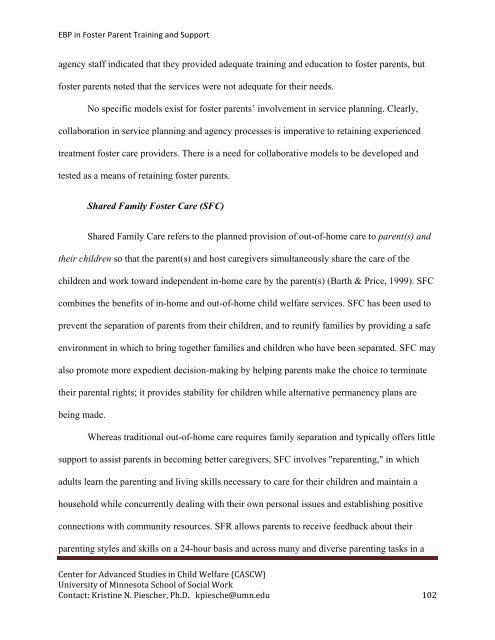Evidence-Based Practice in Foster Parent Training and Support ...
Evidence-Based Practice in Foster Parent Training and Support ...
Evidence-Based Practice in Foster Parent Training and Support ...
Create successful ePaper yourself
Turn your PDF publications into a flip-book with our unique Google optimized e-Paper software.
EBP <strong>in</strong> <strong>Foster</strong> <strong>Parent</strong> Tra<strong>in</strong><strong>in</strong>g <strong>and</strong> <strong>Support</strong>agency staff <strong>in</strong>dicated that they provided adequate tra<strong>in</strong><strong>in</strong>g <strong>and</strong> education to foster parents, butfoster parents noted that the services were not adequate for their needs.No specific models exist for foster parents’ <strong>in</strong>volvement <strong>in</strong> service plann<strong>in</strong>g. Clearly,collaboration <strong>in</strong> service plann<strong>in</strong>g <strong>and</strong> agency processes is imperative to reta<strong>in</strong><strong>in</strong>g experiencedtreatment foster care providers. There is a need for collaborative models to be developed <strong>and</strong>tested as a means of reta<strong>in</strong><strong>in</strong>g foster parents.Shared Family <strong>Foster</strong> Care (SFC)Shared Family Care refers to the planned provision of out-of-home care to parent(s) <strong>and</strong>their children so that the parent(s) <strong>and</strong> host caregivers simultaneously share the care of thechildren <strong>and</strong> work toward <strong>in</strong>dependent <strong>in</strong>-home care by the parent(s) (Barth & Price, 1999). SFCcomb<strong>in</strong>es the benefits of <strong>in</strong>-home <strong>and</strong> out-of-home child welfare services. SFC has been used toprevent the separation of parents from their children, <strong>and</strong> to reunify families by provid<strong>in</strong>g a safeenvironment <strong>in</strong> which to br<strong>in</strong>g together families <strong>and</strong> children who have been separated. SFC mayalso promote more expedient decision-mak<strong>in</strong>g by help<strong>in</strong>g parents make the choice to term<strong>in</strong>atetheir parental rights; it provides stability for children while alternative permanency plans arebe<strong>in</strong>g made.Whereas traditional out-of-home care requires family separation <strong>and</strong> typically offers littlesupport to assist parents <strong>in</strong> becom<strong>in</strong>g better caregivers, SFC <strong>in</strong>volves "reparent<strong>in</strong>g," <strong>in</strong> whichadults learn the parent<strong>in</strong>g <strong>and</strong> liv<strong>in</strong>g skills necessary to care for their children <strong>and</strong> ma<strong>in</strong>ta<strong>in</strong> ahousehold while concurrently deal<strong>in</strong>g with their own personal issues <strong>and</strong> establish<strong>in</strong>g positiveconnections with community resources. SFR allows parents to receive feedback about theirparent<strong>in</strong>g styles <strong>and</strong> skills on a 24-hour basis <strong>and</strong> across many <strong>and</strong> diverse parent<strong>in</strong>g tasks <strong>in</strong> aCenter for Advanced Studies <strong>in</strong> Child Welfare (CASCW)University of M<strong>in</strong>nesota School of Social WorkContact: Krist<strong>in</strong>e N. Piescher, Ph.D. kpiesche@umn.edu 102
















